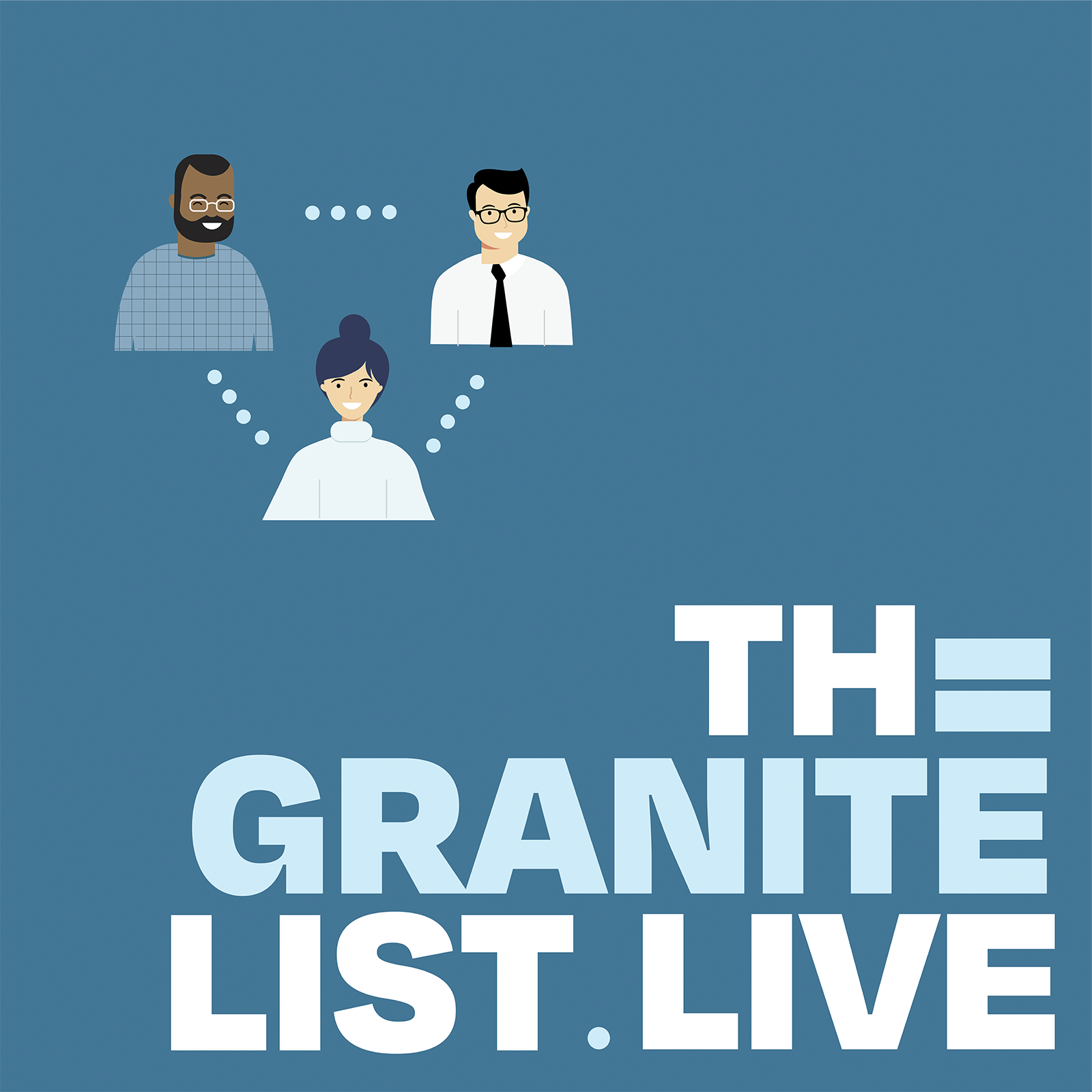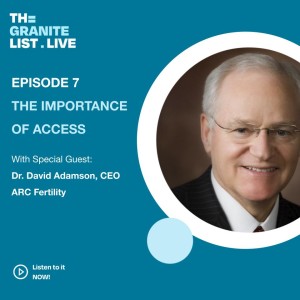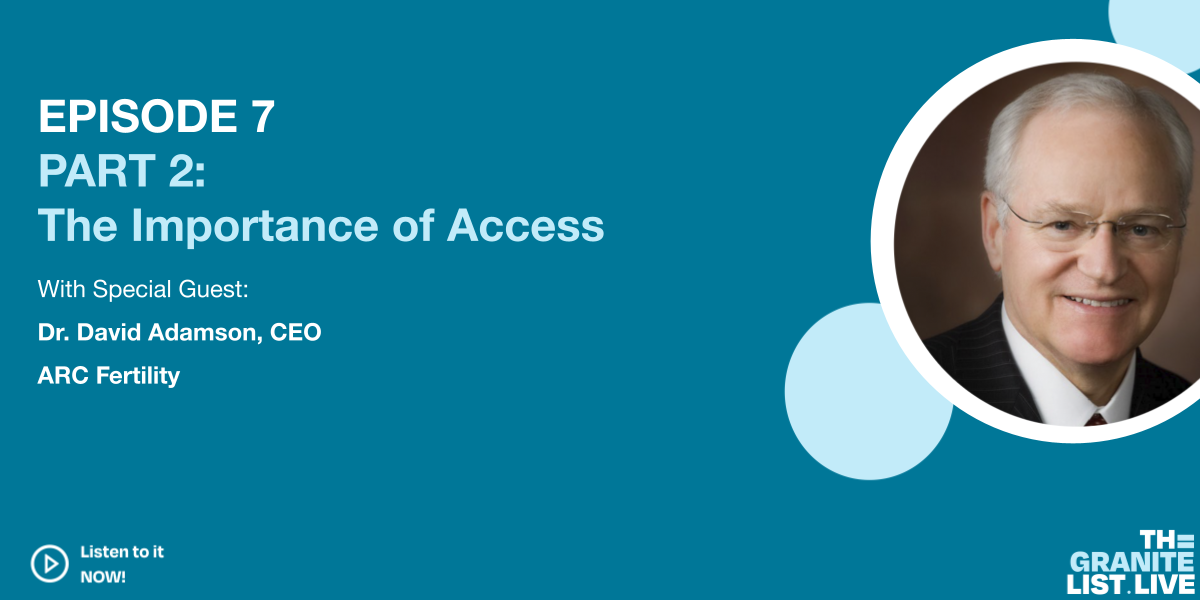
In 1877, the Granite Workers’ Union was the first to offer sick benefits to its employees. They built a way for their community to rally around those who needed medical attention and support to get back on their feet. Today, The Granite List, powered by Connect Healthcare Collaboration, is working to instill that same sense of community by connecting benefits solutions that add real and lasting value to plan members.
Episodes

Wednesday Sep 22, 2021
The Importance of Access
Wednesday Sep 22, 2021
Wednesday Sep 22, 2021

In this episode, Dr. David Adamson, CEO of ARC Fertility covers fertility care from the benefits provider point of view and advises on the importance of learning about the fertility benefits programs that are available so they can better inform their clients about their options and the positive outcomes these programs can bring to their company.
Here is the first part of this interview:
Can Employers Afford to Provide Fertility Benefits? Can They Afford Not to? Part 1
Here is the full transcript of this episode:
Announcer (00:09):
Welcome to another episode of The Granite List Live. Navigating a sea of benefits solution is daunting at best and new vendors emerge every week. Host Leigh Dill and Sally Pace bring brokers and employers a solid resource when it comes to uncovering what's new, what's needed, and what is happening now to allow for the best plan design possible. By staying on top of trends, brokers and employers can in turn stay on top of spending while improving employee engagement and outcomes. Listen in to this episode today where they welcome Michael Thompson.
Announcer (00:42):
Welcome back to the second half of the interview with Dr. David Adamson, CEO of ARC Fertility. In the first half of this interview, Dr. Adamson dispelled several myths about fertility health benefits, including the concern of multiple births. Reproductive health is a personal life journey that is different for everyone, but infertility is often kept in the shadows. Infertility causes stress, life and work dysfunction, and affects productivity. ARC Fertility empowers forward-thinking companies to help their employees overcome and fertility.
About ARC Fertility (01:23):
The ARC FertilityNow app delivers easy to use extensive evidence-based information when you need it for your reproductive health. The ARC FertilityNow app is easy to use for any stage of your reproductive journey. The app provides access to infertility and fertility care resources based on answers to questions, providing personalized answers and support so people can make informed choices and avoid unnecessary medical treatments, prediction tools, tell employees about their individualized chances of a live birth, cost of treatment, and emotional health status.
Announcer (01:56):
The app is integrated with a specialized concierge support team that can support people in their reproductive journeys and connect them with a center of excellence when needed. Visit arcfertility.com today and download the FertilityNow app from Google Play Store or Apple App Store.
Sally Pace (02:14):
I'm going to switch gears a little bit, Dr. Adamson, and talk about from the provider's perspective. Can you talk to our audience a little bit about what the perspective of fertility care is from the benefits provider's point of view?
Dr. David Adamson (02:28):
Sally, that's a question I really love to answer, and the reason I love to answer that is that when I started our company Advanced Reproductive Care, which now does business as ARC Fertility in 1997, the purpose of the company was to increase access to quality fertility care. The reason we need to increase access is that as I mentioned earlier, only one person in four in the United States gets the care they need because of lack of employer coverage, lack of insurance coverage. It doesn't matter how good your system is.
Dr. David Adamson (03:03):
If people cannot afford to access it, then it's not going to be a successful. You're not going to solve the problem. We think access is the single most important issue to deal with today, and that's why we're so excited about having an employer fertility program that does make this program affordable. Now, once somebody goes for care, it's, of course, really important to get quality care. We're really committed to evidence-based, cost-effective care.
Dr. David Adamson (03:34):
If you don't have evidence-based, cost-effective care, it's not going to be good for the employee, and it's certainly not going to be good for the employer or the healthcare system or society. Quality of care really, really matters. And that's why we really focused on the centers of excellence with board-certified reproductive endocrinologists, who are also especially vetted by known individuals, known doctors who know that these are really good doctors and good people practicing good medicine.
Dr. David Adamson (04:01):
The other aspect that I think is really important to providers these days is we recognize how significant an emotional journey is with infertility. Personally, I had one of my children who had a significant problem getting pregnant, had a late pregnancy loss, and had to do several cycles of IVF. I saw up close, very close, how emotionally challenging and difficult this problem is. We're really focused on providing emotional support. This is not just from the doctor, of course.
Dr. David Adamson (04:35):
In fact, it's from all the staff in the doctor's office, from the receptionist to the billing people, the medical assistants, and nurses and the doctors. And in addition to that, it's really important to have solid information about emotional wellness and tools and information about that, which we do provide for all of the employees who are going through this journey to help them manage this.
Dr. David Adamson (05:01):
And of course, very importantly, you have to be able to have resources, to refer people to mental health professionals, infertility counselors when they need that special help, and also to group sessions, for example, through Resolve, which has consumer groups and self-help groups. You have to be really, really committed if you're a provider to the following and supporting the employees on the emotional aspect of this journey. And finally, we have to make it affordable. This is one of the reasons we have packages of services.
Dr. David Adamson (05:35):
Because by putting in just the services that are needed, not anything extra, by getting a set price, we can make this an affordable price. And we make it affordable not only by increasing access with the employer subsidy, but also in our direct to consumer financing program, if the employer has a subsidy, that's not quite enough to meet all the needs that the employee has, then we can use our best in class direct to consumer financing program to get employees additional funds so they can get the care they really need.
Dr. David Adamson (06:10):
I think the real features that are important for providers are to make sure that the care is accessible, to provide high-quality care, give emotional support so that the employee can have a really good journey, the best possible through their medical care, and then to have programs in place to make it affordable so we can make it happen for them.
Leigh Dill (06:33):
I love how you've thought through all facets of the infertility journey and how you've put together a great center of excellence of your providers. Using your network, would the plan members have to travel to see some of your doctors? Do you have a national presence? Can you speak a little bit about that and how the providers get in your network?
Dr. David Adamson (06:55):
Sure. Very happy to answer that. Our centers of excellence network have been set up by requiring a board-certified reproductive endocrinologist who goes through all the usual accreditation steps. In addition to that, as I mentioned, we have an advisory board. We make sure that for every doctor that comes into our network, we have someone who personally knows them and can vouch for the quality of their care and also the quality of their character, and that they'll practice good medicine.
Dr. David Adamson (07:23):
We now have over 365 reproductive endocrinologists across the country in over 250 locations. We're essentially everywhere across the country. Our clinics provide one-quarter, 25%, of all the IVF cycles in the country. We really are in almost all regions of the country and almost every employee would be able to find one of our clinics very close to them.
Dr. David Adamson (07:51):
In the very unusual situations where there might not be someone close, we will look at adding a clinic in that area if we feel there are very high-quality clinics and/or our clinics can work at a distance sometimes with telehealth and with another clinic in that area where the employee actually lives. Very few employees would not have a clinic that's very close and accessible to them.
Sally Pace (08:16):
I want to go back to perspectives. Because like Leigh said, you've really curated your program and moved from direct to consumer now pursuing a product and a process that is attractive to employers. Can you talk to our audience a little bit? We've got both brokers and employers, but let's first talk to employers. What is the fertility care opportunity for them?
Dr. David Adamson (08:42):
Well, the fertility care opportunity for employers is really substantial. First of all, by having a fertility benefit, they're really going to reduce some of their healthcare costs that they're currently paying but know about in their general medical plan through a miscoding and waste and overutilization of services. They'll start to save some money there. They can potentially save even a lot more money by reducing the number of multiples, which has already been reduced quite substantially.
Dr. David Adamson (09:11):
When the services are provided by fertility experts, the multiple birth rate, now the twin rate, is well under 10% and dropping. They can save money from what they're currently spending now. In addition to that, when they put a benefit in, they're going to have very happy employees. For those who need it, this is really a lifesaver. Those employees will become more productive at work. It will also help them a lot in talent retention and talent recruitment.
Dr. David Adamson (09:41):
There are multiple studies that show that with fertility benefits, employees are more likely to be happy with the employer, appreciate the culture in the company, and more likely to recommend the company as a good place to work. There'll be real talent retention and recruitment benefits to the employer. In addition to that, they'll be able to demonstrate in a tangible way that they're really are committed to diversity, equity, and inclusion, so that all employees who have family-building goals and desires will be able to take advantage of their fertility benefit.
Dr. David Adamson (10:17):
I think there are many, many advantages. And in addition to this, because they can choose the subsidy amount, the employer can really manage their costs and get comfortable with the program as they bring it in. I think there are multiple opportunities here for employers who bring in a fertility benefits program.
Sally Pace (10:35):
So then let's switch gears and, like I said, we have a number of our audiences... It's pretty fairly divided. We certainly have a lot of brokers listening in. How can brokers, benefits advisors best help their clients with respect to fertility benefits?
Dr. David Adamson (10:53):
Well, I think it's really important for brokers just, first of all, to recognize how pervasive the discussion is now about fertility benefits and that there are many, many employees and employers who are now talking about fertility benefits. It's very important for brokers to be aware of this and to learn themselves about these benefits and what's there.
Dr. David Adamson (11:18):
It's also important, of course, for the brokers to know about the programs that are out there for fertility benefits and to inform their clients about the opportunity to bring in a benefit that's going to be very desired by their employees, very positive for the company, and one that's also very affordable and going to be associated with a good experience for the employees and a really terrific outcome. It's important for employers and brokers also to know that there have been myths out there.
Dr. David Adamson (11:50):
Some of the myths are that when you have fertility benefits that are way too expensive, and I hope I'm able to discuss the fact that this is not the case, the fertility benefits can be very, very affordable, especially when one looks at the cost savings associated with them. And another myth is that there are still very, very high multiple pregnancy rates. The multiple pregnancy rates are still coming down, but they've come down from 25 or 30% twin rate a decade or so ago now to well under 10% already and dropping very quickly.
Dr. David Adamson (12:22):
And certainly in our program, we can require a single embryo transfer, which really drops the multiple pregnancy rate to about the same multiple rate as the background rate in the general population. The myths about costs, the myths about multiples need to be dispelled by the brokers when they talk to their employers. And then I think it's important for them to show the options and that there are some very high-quality care with a benefit design in the programs that bring cost-effective affordable care and really, really good outcomes that will be a big advantage to the company.
Dr. David Adamson (13:00):
I think these are the major points that brokers want to inform themselves about and they want to make sure they're talking to all their clients about it as well.
Leigh Dill (13:09):
Well, thank you. I think it's such a great topic right now and for employers and brokers to be educated on it, especially with the platform that you offer, because you are one of a kind. The timing is right for what you have to offer for these employers. In summary, Dr. Adamson, we do ask all of our guests to share their favorite book. What would you recommend or what are you reading right now that you want to share with our audience?
Dr. David Adamson (13:38):
Well, that's a good question. There's a lot of wonderful books out there now and literature on what we need to do to improve the healthcare system. But one of the ones that I think is very interesting and it's also interesting that it was really published over a decade ago, but I think the message is really, really sound today, and it's called The Triple Aim Focus. This is The Triple Aim: Care, Health, and Cost by Donald Berwick and Thomas Nolan and John Whittington, which was published in 2008.
Dr. David Adamson (14:12):
This talks about the important triple aims in healthcare and to transform our healthcare system to be a more cost-effective system with better outcomes. What they talk about is improving the experience of care for patients and employees, improving health outcomes, and reducing per capita costs.
Dr. David Adamson (14:32):
We're really pleased that our program is focused on exactly those three things, improving experience by understanding and educating employees and providing them a lot of support on their fertility journey, by improving health outcomes by using evidence-based and single embryo transfer and reducing multiple rates, and by reducing costs by avoiding waste and overutilization by using only best standards of care, and by having a packaged a services, which include everything that's needed, but not more than is needed.
Dr. David Adamson (15:11):
I think if we focus on these three goals, we're going to achieve a really exemplary healthcare system. And I know that we're working to do that with our fertility benefits. That's The Triple Aim: Care, Health, and Cost by Donald Berwick from 2018.
Sally Pace (15:28):
Fantastic. Well, we certainly share in that vision with you, and I can't thank you enough for spending time with us today. For the audience that is listening, that wants to learn more about ARC Fertility's employer program, I want to encourage all of you to visit arcfertility.com and toggle over to the employer program tab to see how this program and how attention to this issue can really add intrinsic and lasting value both for your plan members and for, as you pointed out, attracting and retaining talent.
Sally Pace (16:02):
So with that, I want to thank you on behalf of Leigh and I for joining us today. Thanks to you, Dr. Adamson. Thanks to our audience. And we invite you to tune in to another episode of The Granite List Live. Have a great day.
Dr. David Adamson (16:17):
Thank you very much.
Leigh Dill (16:18):
Thank you.
Announcer (17:42):
If you missed the first half of this interview, be sure to go back and listen to Can employers afford to provide fertility benefits, and can employers afford not to with Dr. David Adamson, CEO of ARC Fertility. Thank you for listening to this episode of The Granite List Live. Access our entire library by visiting your favorite podcast venue or subscribe in our site, thegranitelist.live.

No comments yet. Be the first to say something!